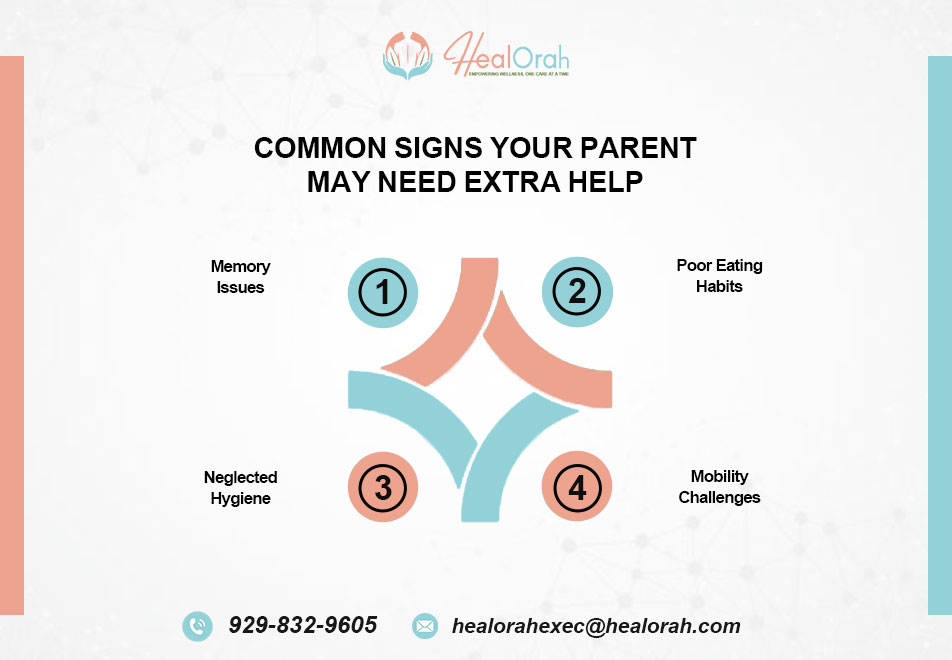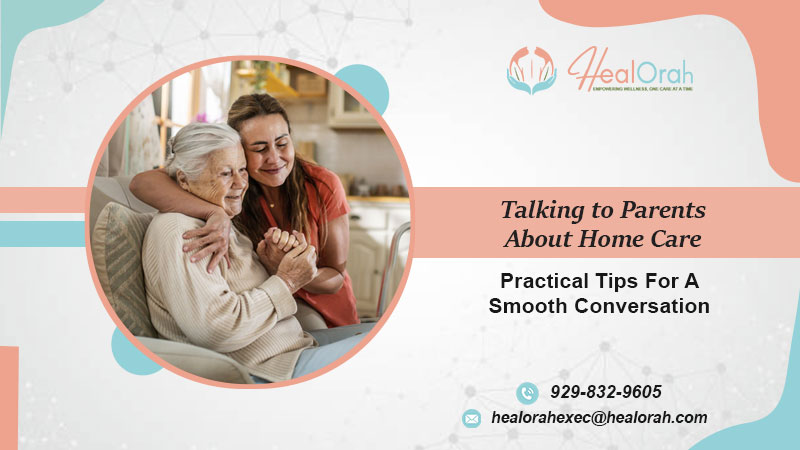Talking to parents about home care is hard, but it often becomes truly necessary with age. Many elderly parents require assistance with tasks such as cooking, walking, and remembering simple daily activities. Moreover, some parents hide pain and forget to share their health changes.
Table of Contents
ToggleCaring for elderly parents means watching closely and offering support with love and patience. That is why early talks help prevent stress, accidents, and health problems later on. It also makes parents feel safe, heard, and supported in their changing needs every day.
Common Signs Your Parent May Need Extra Help
Sometimes parents forget simple things like locking doors and turning off lights. Moreover, they may skip meals and miss their regular medicine. These are early signs that something is not okay.

As a result, seeking help for aging parents is crucial. With time, their safety can become a big concern. Watch gently, and talk with love and care.
Behavioral and Physical Clues to Watch
You may notice memory lapses and slow walking at home. Because of this, falls and confusion become more common in daily tasks. These are strong signs your parents need a nursing home and care. So, getting help for aging parents becomes more urgent and clear.
- Forgetting names, dates, and repeating the same story often
- Skipping meals or eating spoiled food from the fridge
- Unwashed clothes, messy hair, and a bad smell at home
- Difficulty walking, using stairs, and getting out of bed.
How to Start the Home Care Conversation with Compassion
Talking to parents about home care takes love, care, and kind words. Choose a calm time and speak gently. Tell them I am here to support you, so they feel safe and heard.
Moreover, listen fully without cutting them off. Let them know home care means help, not control. Start small, so they feel in charge and not afraid. This way, they feel respected and part of the choice.
Best Practices for Sensitive Conversations
Speak in a soft tone and give your parents time to respond. Also, use kind words that show love and support. Because emotions run high, stay calm even if they say no. Explain gently why help is needed without pressure and fear.
- Do speak with respect, even if they disagree
- Do give time for them time to think and respond
- Do not rush into decisions without their input
- Do not use guilt, fear, or force during the talk
What If Your Elderly Parent Refuses Help?
Many elderly parents need help, but they often say no when you offer support. They feel afraid and think they will lose control. Some believe they can still manage everything on their own. Talking to parents about home care is not always easy, but you must try.
Use kind words and stay calm during the talk. Moreover, let them know you are only helping. This will make the talk softer and easier to accept, even if the elderly parent refuses assisted living at first.
Tips for Managing Emotional Denial and Fear
Some parents fear losing their space and freedom. Others worry they may look weak or useless. Offer a small care trial to see how it helps. Use shared choices so they still feel in control.
Choosing the Right Care Solution for Your Parent
Sometimes, in-home care is better than assisted living. It gives care with comfort. Home care feels safer, familiar, and more personal. It helps your parents stay happy in their own space.
Moreover, getting help for aging parents early can avoid big problems. Talking to Parents About Home Care now may save stress later.
- In-home care brings comfort and daily support.
- Assisted living gives full-time medical help.
- Home care lets your parents stay near family.
- Always match care with your parents’ real needs.
Why Choose HealOrah for Trusted Elderly Home Care
HealOrah offers trusted elderly home care with kindness and deep understanding. Families get personalized care made just for their parents’ needs. The licensed staff work with love and full support. Moreover, the team builds strong bonds through emotional care every day.
Their family-centered approach keeps your loved ones happy and safe. You get real help with no stress and worry. Learn more about how Heal Orah supports your family’s care journey.
Book a consultation with HealOrah to create your personalized home care.
Conclusion
Talking to parents about home care is a loving and wise step for any family. Some parents may feel afraid and unsure, so speak with care and patience. Moreover, listen deeply and allow them to share their feelings without judgment. Because every parent is different, give time and space for trust to grow.
HealOrah offers gentle, trusted help that supports families through every stage. Their team understands what aging parents truly need. Choosing help early makes the journey easier and more peaceful. So, begin the talk with love and honesty. Talking to parents about home care can build comfort, care, and lasting support.
FAQS
How do I start talking to parents about home care?
Begin with love and concern, not fear. Use gentle language and express how care can support their independence.
What signs show that my elderly parent needs help at home?
Look for falls, confusion, and neglected hygiene. These often suggest that daily tasks are becoming harder without support.
What if my parents refuse assisted living or home care?
Respect their wishes and offer trial care. Involve a doctor and a counselor if trust needs reinforcement.
When is the right time to consider getting help for aging parents?
When safety, memory, and mobility decline, do not wait. Early care ensures better comfort and less family stress.
Why choose HealOrah for elderly home care?
HealOrah gives expert, compassionate help tailored to family needs. Their care supports dignity, trust, and daily comfort.





